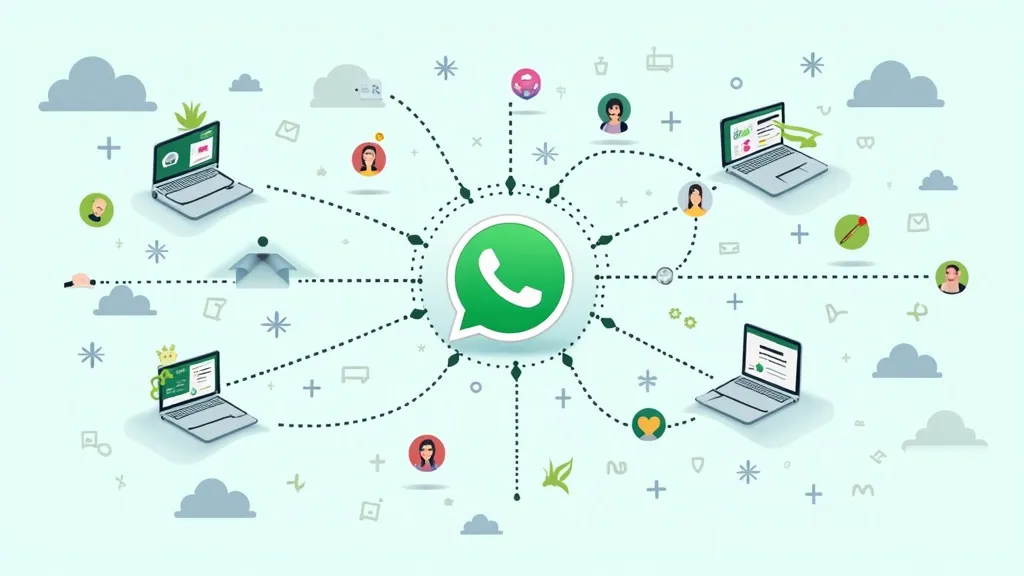Uncover the power of Omnichannel WhatsApp in enhancing customer service and engagement. As businesses strive to create seamless communication experiences, Omnichannel WhatsApp emerges as a vital tool for integrating various customer interaction channels. This article explores expert insights into how businesses can leverage this platform to boost efficiency and customer satisfaction.

In today's fast-paced digital world, businesses increasingly recognize the need for effective communication strategies. Omnichannel communication offers a holistic approach by integrating every customer touchpoint, ensuring a seamless experience. One of the platforms revolutionizing this approach is Omnichannel WhatsApp, a versatile tool that enhances engagement and supports businesses' strategic objectives. This comprehensive strategy not only streamlines communication but also builds stronger relationships between businesses and their customers, ultimately leading to increased satisfaction and loyalty.
Omnichannel WhatsApp refers to the integration of WhatsApp into an organization's communication framework, enabling businesses to unify various communication channels. By using this approach, companies can provide consistent and personalized interactions across all platforms, including email, social media, and in-person contacts. This connectivity is crucial for building and maintaining strong customer relationships. Omnichannel WhatsApp leverages the popularity of WhatsApp, utilized by millions globally, allowing businesses to meet customers where they are most comfortable communicating. This includes enabling support agents to respond instantly while accessing a customer’s full history across all platforms, ensuring personalized engagement.
At the core of Omnichannel WhatsApp's success is its ability to provide a customer-centric experience. Businesses choose these strategies primarily for:
Effective engagement strategies hinge on understanding and meeting customer expectations. Omnichannel WhatsApp supports these strategies by:
Implementing an Omnichannel WhatsApp strategy can yield significant benefits, including:
While the potential advantages of Omnichannel WhatsApp are significant, businesses must also consider potential challenges:
To successfully integrate Omnichannel WhatsApp, organizations can follow these steps:
| Platform | Features | Benefits |
|---|---|---|
| Platform A | Chatbot Integration, CRM Sync | Enhanced automation, improved data management |
| Platform B | AI-driven Analytics, Multi-lingual support | Advanced insights, wider reach |
| Platform C | Customer Segmentation, Cross-Channel Messaging | Targeted campaigns, consistent messaging across platforms |
| Platform D | Real-time Reporting, Custom Workflows | Improved decision-making, tailored customer interactions |
| Platform E | Integration with Payment Systems, Direct Calls | Streamlined transactions, enhanced customer experience |
The future of Omnichannel WhatsApp is promising as technology evolves and the demand for seamless communication grows. The emphasis on AI and machine learning is expected to continue, enhancing personalization and predictive engagement strategies. Future developments may include more sophisticated chatbots capable of handling complex queries through natural language processing. Additionally, there is significant potential for integration with augmented reality (AR) to provide immersive customer experiences, such as virtual try-ons for retail products.
Moreover, as customer expectations evolve, the role of Omnichannel WhatsApp will expand to remain a core element of digital engagement. Businesses that leverage emerging technologies to connect better with their customers will likely observe significant returns on their investments, making it an essential strategy going forward. As more companies embrace this integrated approach, Omnichannel WhatsApp will enable them to maintain a competitive advantage in their respective industries.
What is Omnichannel communication?
Omnichannel communication integrates all customer interaction channels to provide a consistent and cohesive customer experience, allowing for a seamless transition between platforms.
How can businesses benefit from Omnichannel WhatsApp?
Businesses can benefit through improved customer engagement, increased operational efficiency, and valuable insights from consolidated data analytics, which help refine marketing strategies and product offerings.
What are the challenges in implementing Omnichannel WhatsApp?
Key challenges include technical integration, ensuring data security, and committing resources for management and training to properly leverage the platform’s capabilities.
Is Omnichannel WhatsApp suitable for small businesses?
Yes, Omnichannel WhatsApp can be tailored to suit the needs of businesses of all sizes, offering scalability to grow with the company. The cost efficiencies associated with digital communication particularly benefit smaller businesses looking to maintain customer engagement without a significant increase in overhead costs.
How can companies ensure they provide a consistent experience across channels?
To provide a consistent experience, businesses should unify their communication strategy across all platforms. This includes maintaining a centralized database that tracks customer interactions, training employees on contemporary communication standards, and establishing clear guidelines on how to handle customer inquiries across different channels. Regularly reviewing and optimizing these processes can further ensure consistency.
What kind of analytics and reports can companies expect from an Omnichannel WhatsApp strategy?
Companies can expect analytics that cover customer engagement metrics, response times, customer satisfaction rates, and conversion rates. These insights can help businesses refine their strategies, understand customer preferences better, and predict future behaviors, allowing them to improve and personalize their offerings continually.
Will using Omnichannel WhatsApp help in crisis management?
Yes, utilizing Omnichannel WhatsApp can significantly aid in crisis management by providing a faster means of communication with customers. Immediate updates can be sent through WhatsApp, ensuring timely and transparent communication during crises. This not only helps maintain customer trust but also showcases a company's commitment to customer care.
Can businesses utilize WhatsApp for marketing purposes?
Absolutely! Businesses can utilize WhatsApp for targeted marketing campaigns, sending personalized messages and promotions directly to customers. With customer consent, businesses can leverage WhatsApp to conduct surveys and collect feedback, all of which provide valuable data to enhance marketing strategies.
How important is customer feedback in the Omnichannel WhatsApp strategy?
Customer feedback is crucial as it allows businesses to understand their customers’ needs and expectations better. By leveraging feedback collected through WhatsApp interactions, businesses can make data-driven decisions to enhance their service offerings, address concerns promptly, and improve overall customer satisfaction.